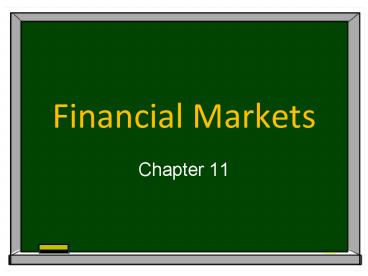Financial Markets - PowerPoint PPT Presentation
1 / 30
Title:
Financial Markets
Description:
Financial Markets Chapter 11 Objectives Differentiate between savings and investing. Analyze the impact of savings on our economy. Compare stocks, mutual funds, and ... – PowerPoint PPT presentation
Number of Views:115
Avg rating:3.0/5.0
Title: Financial Markets
1
Financial Markets
- Chapter 11
2
Objectives
- Differentiate between savings and investing.
- Analyze the impact of savings on our economy.
- Compare stocks, mutual funds, and bonds.
- Create a diversified portfolio.
3
Savings
Dollars available when people abstain from
consumption comes from disposable
income. Disposable Income - funds left over
after taxes/benefits are paid
4
Types of Savings
- Checking Account
- Savings Account
- Money Market
- Certificate of Deposit
- Mattress/Cookie Jar
5
- U.S. PERSONAL SAVINGS RATE
6
Savings and Economic Growth
Financial system brings savers and borrowers
together and helps economy grow. Businesses can
borrow saved funds to produce new goods/services,
build new plants, buy new equipment, and create
more jobs. Individuals can borrow saved funds to
buy a house, buy a car, go to college, etc.
7
Investing
Using saved money to make more money. Involves
risk GREATER THE RISK, GREATER THE RETURN?
8
Investment Pyramid
9
Types of Investments
- Stocks
- Mutual Funds
- Bonds
10
Stocks
- Stock ownership in a corporation
- Common Stock
- Preferred Stock
11
Stocks Cont
Common Stock Preferred Stock
Traded most frequently
Represents ownership in company Represents ownership in company
One vote per share Little or no voting rights
Dividends variable rate not guaranteed Dividends annual payment rate is usually percentage of stocks value
Paid last in event of bankruptcy/liquidation Paid before common stockholders but after creditors in event of bankruptcy/liquidation
12
New York Stock Exchange (NYSE)
- Called the Big Board market of choice for the
largest companies in America - Largest and most prestigious in world
- Founded in 1792
- Auction-based
- Sample of Companies Traded
- Wal-mart
- General Electric
- McDonalds
- Citigroup
Biba S. Kavass, Rossview High School
13
American Stock Exchange (AMEX)
- 3rd largest exchange in the U.S.
- Has merged with NASDAQ
- Trades mostly in small-cap stocks
- Auction-based
- Samples of stock traded
- Alcoa, Inc.
- Emerson Radio Corp.
- Golf Trust of America
Biba S. Kavass, Rossview High School
14
NASDAQ (National Association of Securities
Dealers Automated Quotations )
- Founded in 1972
- OTC (over-the-counter) electronic exchange
buyers and sellers connected by computers - More than 3,200 companies represented used to
be just technology now has expanded - Sample companies
- Microsoft
- Oracle
- 1-800-flowers.com
- Nathans Hot Dogs
Biba S. Kavass, Rossview High School
15
Why Bears and Bulls?
Bears stocks are going down 20 decline in
prices over time- bears hibernate Bulls
stocks are going up 20 increase in prices over
time - Bulls charge
Biba S. Kavass, Rossview High School
16
FACTORS AFFECTING STOCK PRICES
- Corporate
- Economy
- Consumer Sentiment
17
Factors Affecting Stock Prices
- Corporate
- Profitability
- Sound business management
- Growth potential
- Size of debt
- Dividend Yield
- Price-Earnings (P/E) ratio
Biba S. Kavass, Rossview High School
18
FACTORS AFFECTING STOCK PRICES
- Economic
- Inflation/Recession
- Interest Rates
- Consumer Spending
- Employment
Biba S. Kavass, Rossview High School
19
FACTORS AFFECTING STOCK PRICES
- Consumer Sentiment Index
- Compiled monthly by University of Michigan
- Query at least 500 U.S. households via telephone
- Focuses on 3 areas
- How consumers view prospects for their own
financial situation - How they view prospects for the general economy
over the near term - Their view of prospects for the economy over the
long term
20
Consumer Sentiment Index
21
Mutual Funds
An investment vehicle that is made up of a pool
of funds collected from many investors for the
purpose of investing in securities such as
stocks, bonds, money market instruments and
similar assets. Allows people to invest in the
market without risking all they have in one or
a few companies.
22
Bonds
Loan for a defined period of time at a fixed
interest rate to a corporation, U.S. and foreign
governments. Commonly referred to as fixed
income securities. Used to finance projects and
activities.
23
Types of Bonds
- Corporate Bonds
- Municipal Bonds
- Government Savings Bonds
- Treasury Notes and Bonds
- Treasury Bills
24
Corporate Bonds
- Monies loaned to corporations
- Usually purchased as long-term investments but
can be quickly sold - Interest (dividends) are taxable income per IRS
25
Municipal Bonds
- Referred to as munis
- Issued by state and local governments
- Regarded as safe
- Tax-exempt on interest paid to investors
26
Government Savings Bonds
- Low denomination, nontransferable bonds issued by
the US government - Safe but very little return
27
Treasury Notes and Bonds
- T-Notes US government obligations with
maturities of 2-10 years. - T-Bonds maturity dates ranging from 10 30
years. - Both come in denominations of 1,000
- Safest of all investments lowest return because
minimal risk.
28
Treasury Bills
- Referred to as T-bill
- Short-term obligation with a maturity of 4, 13,
or 26 weeks - Minimum denomination of 1,000
- No interest sold on discount basis
- Ex. Buy at 960.00/Sell at 1,000.00/Return of
30.00
29
Portfolio Diversification
- Developing a portfolio that allocates assets
using a variety of investment vehicles - Most common are cash, stocks, mutual funds, and
bonds. - Spread the risk to receive
- a higher average rate of
- return.
30
- Change is the investors only certainty.
- Thomas Rowe Price, Jr.































